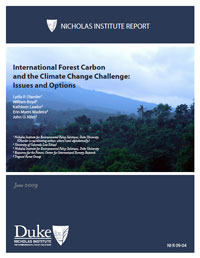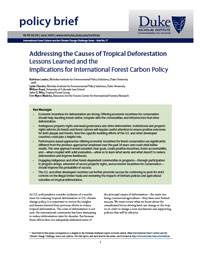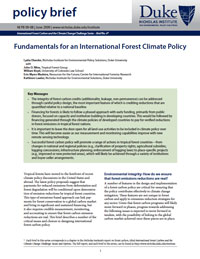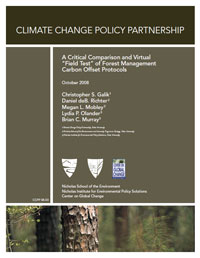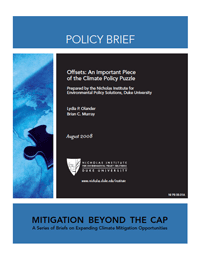Publications
International Forest Carbon and the Climate Change Challenge: Issues and Options
A multi-author collaborative report highlighting the most promising opportunities and pressing challenges associated with the effort to bring deforestation and forest degradation into climate policy.
Addressing the Causes of Tropical Deforestation: Lessons Learned and the Implications for International Forest Carbon Policy
International Forest Carbon and the Climate Change Challenge Series – Brief No. 5
Fundamentals for an International Forest Climate Policy
Tropical forests have moved to the forefront of recent climate policy discussions in the United States and abroad. The latest policy proposals suggest that payments for reduced emissions from deforestation and forest degradation will be conditional upon demonstration of emission reductions by tropical forest countries. This type of emissions-based approach can link payments for forest conservation to a global carbon market and bring in signficant and sustained financing, but it also requires credible measurement, monitoring, and accounting to ensure that forest carbon emission reductions are real. This brief describes a number of the critical issues and choices in designing international forest carbon policy.
Responding to Concerns and Questions
Efforts to include emissions from deforestation and forest degradation in climate policy have gained considerable traction in recent years in the United States and abroad. With mounting evidence that atmospheric carbon dioxide concentrations cannot be stabilized at a prudent level without addressing emissions from the forest sector, policy makers are actively seeking ways to integrate international forest carbon into existing and emerging greenhouse gas compliance regimes. This brief addresses common criticisms and outstanding questions regarding the inclusion of forest carbon in climate policy.
International Forest Carbon in Current Policy Proposals
Efforts to include emssions from deforestation and forest degradation in climate policy have gained considerable traction in recent years at multiple levels of governance. With mounting evidence that atmospheric carbon dioxide concentrations cannot be stabilized at a prudent level without addressing emissions from the forest sector, policy makers are actively seeking ways to integrate international forest carbon into existing and emerging greenhouse gas compliance regimes. Since 2005, for example, there has been concerted effort in the United Nations Framework Convention on Climate Change process to integrate reduced emissions from deforestation and forest degradation into a post 2012 climate treaty.
Sustaining Livelihoods While Reducing Emissions From Deforestation
Reducing tropical deforestation is a necessary component of any comprehensive strategy to address climate change. Mechanisms to reduce tropical deforestation in climate change policy are currently under consideration at the United Nations Framework Convention on Climate Change, as part of U.S. climate policy deliberations and through other public and private sector endeavors across the world.
A Virtual “Field Test” of Forest Management Carbon Offset Protocols: The Influence of Accounting
Of the greenhouse gas mitigation options available from U.S. forests and agricultural lands, forest management presents amongst the lowest cost and highest volume opportunities. A number of carbon accounting shemes or protocols have recently emerged to track the mitigation achieved by individual forest management projects. Using 50-year carbon cycling data from the Calhoun Experimental Forest in South Carolina, carbon storage is estimated for a hypothetical forest management carbon offset project operating under seven of these protocols.
A Critical Comparison and Virtual "Field Test" of Forest Management Carbon Offset Protocols
A paper by the Climate Change Policy Partnership comparing seven existing forest management offset protocols
Treatment of Early Agricultural and Forestry Actors in a Federal Cap-and-Trade
Early actors are defined as those who engaged in greenhouse gas activities, emission reductions or carbon sequestration before the initiation of a mandatory federal cap and associated offset program. The critical question for early actors is whether or how their early actions might be credited in a federal climate policy.
Offsets: An Important Piece of the Climate Policy Puzzle
Offsets are heralded by some as a salvation for U.S. cliamte policy, keeping costs down, bring new profits to agriculture and saving forests, all while still mitigating climate change. Others claim they are a false hope that will thwart the potential for an effective U.S. policy by allowing fossil fuel emitters to buy their way out of solving the problem. The truth likely lies somewhere in the middle.

